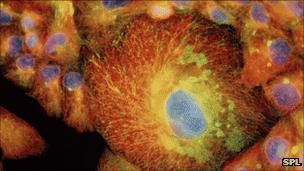Cancer drug resistance clue found
- Published

It may be possible to extend the usefulness of cancer drugs by preventing drug resistance in tumours, say researchers.
A study, published in Science Translational Medicine, showed a chemical reaction went into overdrive as resistance developed.
Scientists said drugs were already on the market which interfered with the process.
Cancer Research UK said the field offered "tremendous optimism".
An international team of researchers were investigating the cancer drug cetuximab, which is used to treat colorectal cancer, head and neck cancers and some lung cancers.
It targets a protein - epidermal growth factor receptor (EGFR) - which drives tumour growth.
They said "all patients will ultimately develop resistance to cetuximab" but that little was known about how the resistance developed.
Alternative route
Experiments showed the cancerous cells acted like cars in a traffic jam - when one route was blocked, they found an alternative.
In this case, the tumours replaced the EGFR route with one involving a different protein - ERBB2 - and continued to grow.
Dr Pasi Janne, from the Dana-Farber Cancer Institute in Boston, said: "ERBB2 activates a critical signalling pathway that is not normally blocked by cetuximab, and in this way subverts cetuximab's function.
"Because ERBB2 isn't affected by cetuximab, this is an easy way for cancers to become resistant to the drug."
The researchers said several drugs which target ERBB2 had already been approved so "the findings from the current study can be used to design potential clinical therapies".
However, they caution that there are likely to be other ways that cancers can develop resistance.
Henry Scowcroft, science information manager at Cancer Research UK, said: "Unfortunately, patients' tumours can become resistant to treatment, and understanding why this happens is a major challenge in cancer research.
"This new study is a great example of how researchers are uncovering the molecular tricks cancer cells use to evade treatment, and finding out how to stop them doing so.
"Research like this gives us tremendous optimism that we're on the cusp of a real revolution in cancer, although there's a lot more work to do to make this a reality."
- Published25 January 2010
- Published22 October 2006
- Published2 November 2004